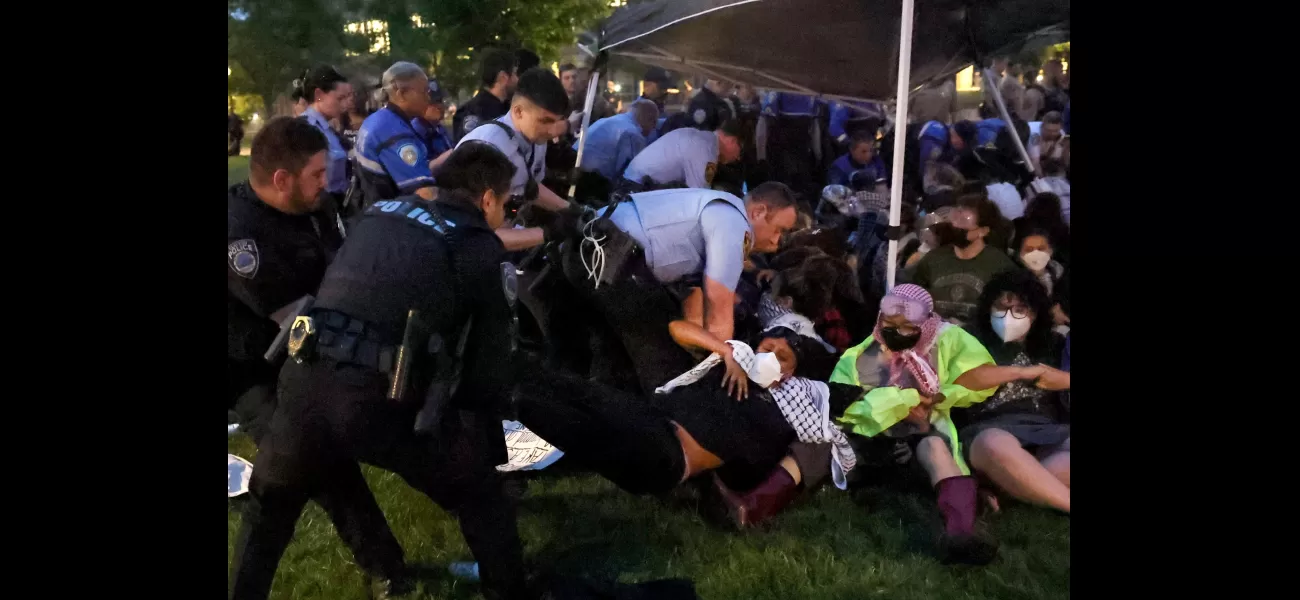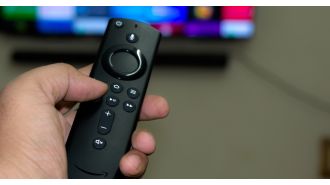College students are getting arrested for protesting against their schools' relationships with Israel before graduation.
Students across the US are protesting the Israel-Hamas war by camping out on college campuses, with some universities trying to disband the encampments and arresting protesters.
April 28th 2024.

College campuses across the nation are in a state of turmoil as graduation ceremonies draw near. The ongoing conflict between Israel and Hamas has sparked passionate protests, with students demanding that their schools sever financial ties with Israel. While many campuses remained quiet on Sunday, Saturday saw a significant number of arrests at universities such as Indiana University, Arizona State University, and Washington University in St. Louis. These arrests bring the total number of nationwide arrests to almost 900, since the New York police dismantled a pro-Palestinian encampment at Columbia University and detained over 100 demonstrators on April 18th.
Since then, students have taken a stand by setting up pro-Palestinian encampments at various universities across the country. This has led to a range of responses from university administrators, including arrests, criminal charges, and student suspensions. Some administrators have chosen to simply plead with the protesters to leave. However, the fate of these students has become a central issue in the protests, as both students and an increasing number of faculty members call for amnesty. The question remains: will these suspensions and legal records follow these students into their adult lives?
The tension has even spread to the faculty level, with some universities in California, Georgia, and Texas seeing symbolic votes of no confidence in their leadership. White House national security spokesman John Kirby has acknowledged the strong emotions surrounding the issue, but has emphasized that managing the protests falls under the jurisdiction of local authorities. He stated on ABC's "This Week" that while people should have the freedom to express their views publicly, it must be done peacefully.
In a recent interview, Senate Republican Leader Mitch McConnell expressed concern over the situation, placing the responsibility on college administrators. He condemned the presence of anti-Semitism, stating that it is completely unacceptable and that he has been shocked to see it in our country. These sentiments were echoed by other politicians, including John Kirby and President Joe Biden.
The protests began at Columbia University in New York City, sparking similar demonstrations at universities nationwide. Negotiations between students and administrators have taken place at Columbia, with the university setting deadlines for protesters to disperse. However, these deadlines have been repeatedly missed, and the university has chosen not to bring in police at this time.
In St. Louis, over 80 people were arrested during a protest at Washington University. The demonstration started in public areas before moving to the campus, and according to St. Louis Board of Aldermen President Megan Green, remained peaceful until the arrival of police. The St. Louis Police Department has stated that they assisted campus police but did not make any arrests.
In California, the University of Southern California has temporarily closed its campus to non-residents due to vandalism by an unauthorized group that has been illegally camping on the grounds. The university has attempted to meet with the students, but they have declined. USC is hoping for a more reasonable response on Sunday before they are forced to take further action.
The situation has also escalated in Boston, where police in riot gear cleared an encampment on the campus of Northeastern University. Over 100 protesters were arrested on charges of trespassing and disorderly conduct. Northeastern has stated that the demonstration, which began a few days ago, has been "infiltrated by professional organizers" with no affiliation to the university. The student group, Huskies for a Free Palestine, has denied these claims and stated that counter-protesters were responsible for any hate speech. Students at the protest have maintained that their event was peaceful.
The protests have spread to other campuses as well, with arrests being made at Indiana University and Arizona State University. At Indiana University, 23 people were arrested for setting up tents and canopies in violation of school policy, while 69 people were arrested at Arizona State University for setting up an unauthorized encampment.
The nationwide campus protests stem from the ongoing Israel-Hamas conflict. The violence began when Hamas launched a deadly attack on southern Israel, resulting in the death of over 1,200 people, most of whom were civilians. In response, Israel launched an offensive in Gaza, resulting in the death of over 34,000 Palestinians, according to the local health ministry. The protests have been labeled as anti-Semitic by Israel and its supporters, while critics argue that these allegations are being used to silence their opposition. While there have been instances of anti-Semitic remarks and violent threats, organizers of the protests, some of whom are Jewish, maintain that their movement is peaceful and aimed at defending Palestinian rights and protesting the war.
In conclusion, the protests on college campuses have sparked a heated debate and raised important questions about free speech, student rights, and the ongoing Israel-Hamas conflict. As tensions continue to rise, it remains to be seen how universities and local authorities will handle the situation.
Since then, students have taken a stand by setting up pro-Palestinian encampments at various universities across the country. This has led to a range of responses from university administrators, including arrests, criminal charges, and student suspensions. Some administrators have chosen to simply plead with the protesters to leave. However, the fate of these students has become a central issue in the protests, as both students and an increasing number of faculty members call for amnesty. The question remains: will these suspensions and legal records follow these students into their adult lives?
The tension has even spread to the faculty level, with some universities in California, Georgia, and Texas seeing symbolic votes of no confidence in their leadership. White House national security spokesman John Kirby has acknowledged the strong emotions surrounding the issue, but has emphasized that managing the protests falls under the jurisdiction of local authorities. He stated on ABC's "This Week" that while people should have the freedom to express their views publicly, it must be done peacefully.
In a recent interview, Senate Republican Leader Mitch McConnell expressed concern over the situation, placing the responsibility on college administrators. He condemned the presence of anti-Semitism, stating that it is completely unacceptable and that he has been shocked to see it in our country. These sentiments were echoed by other politicians, including John Kirby and President Joe Biden.
The protests began at Columbia University in New York City, sparking similar demonstrations at universities nationwide. Negotiations between students and administrators have taken place at Columbia, with the university setting deadlines for protesters to disperse. However, these deadlines have been repeatedly missed, and the university has chosen not to bring in police at this time.
In St. Louis, over 80 people were arrested during a protest at Washington University. The demonstration started in public areas before moving to the campus, and according to St. Louis Board of Aldermen President Megan Green, remained peaceful until the arrival of police. The St. Louis Police Department has stated that they assisted campus police but did not make any arrests.
In California, the University of Southern California has temporarily closed its campus to non-residents due to vandalism by an unauthorized group that has been illegally camping on the grounds. The university has attempted to meet with the students, but they have declined. USC is hoping for a more reasonable response on Sunday before they are forced to take further action.
The situation has also escalated in Boston, where police in riot gear cleared an encampment on the campus of Northeastern University. Over 100 protesters were arrested on charges of trespassing and disorderly conduct. Northeastern has stated that the demonstration, which began a few days ago, has been "infiltrated by professional organizers" with no affiliation to the university. The student group, Huskies for a Free Palestine, has denied these claims and stated that counter-protesters were responsible for any hate speech. Students at the protest have maintained that their event was peaceful.
The protests have spread to other campuses as well, with arrests being made at Indiana University and Arizona State University. At Indiana University, 23 people were arrested for setting up tents and canopies in violation of school policy, while 69 people were arrested at Arizona State University for setting up an unauthorized encampment.
The nationwide campus protests stem from the ongoing Israel-Hamas conflict. The violence began when Hamas launched a deadly attack on southern Israel, resulting in the death of over 1,200 people, most of whom were civilians. In response, Israel launched an offensive in Gaza, resulting in the death of over 34,000 Palestinians, according to the local health ministry. The protests have been labeled as anti-Semitic by Israel and its supporters, while critics argue that these allegations are being used to silence their opposition. While there have been instances of anti-Semitic remarks and violent threats, organizers of the protests, some of whom are Jewish, maintain that their movement is peaceful and aimed at defending Palestinian rights and protesting the war.
In conclusion, the protests on college campuses have sparked a heated debate and raised important questions about free speech, student rights, and the ongoing Israel-Hamas conflict. As tensions continue to rise, it remains to be seen how universities and local authorities will handle the situation.
[This article has been trending online recently and has been generated with AI. Your feed is customized.]
[Generative AI is experimental.]
0
0
Submit Comment





